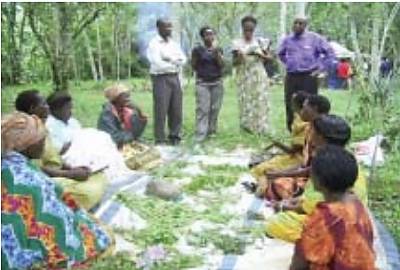- Uganda


PROMETRA and Promotion of Traditional Medicine in Uganda

© The Cross-Cultural Foundation of Uganda, 2008
1. ICH domains
Social practices, knowledge and practices concerning nature and the universe2. Short description
PROMETRA is an international organisation that was established in 1971. With 28 national chapters — mostly in Africa — dedicated to the safeguarding of African traditional medicine and indigenous science through research, training and advocacy.
PROMETRA-Uganda has mobilised traditional health practitioners into groups and associations and brings them together to share, learn and improve their healing practices. Hundreds of traditional health practitioners converge weekly at its training centre to, among other things, study the causes and symptoms of illnesses such as HIV / AIDS or malaria. The centre and its approach has not only strengthened the sustainability of the work of traditional health practitioners, but has also increased public awareness of traditional medicine in Uganda.
Further information:
More information on PROMETRA-Uganda and their work can be found in the following resources (all in English), as well as two examples of their work in fighting HIV and malaria:
http://prometra.org/wp-content/uploads/2017/01/PROMETRA-Uganda-profile-2010.pdfThe 30-hectare plot of land set in a forest which acts as a natural pharmacy and a library of raw materials:
https://unitedplantsavers.org/forest-school-for-traditional-health-practitioners-prometra-uganda/
‘Drawing on culture to fight HIV/AIDS – six stories – 2008’ http://crossculturalfoundation.or.ug/Downloads/drawing_on_culture_to_fight_hivaids.pdf
Medicinal plants used in malaria treatment by PROMETRA herbalists in Uganda
http://prometra.org/wp-content/uploads/2017/03/Medicinal-Plants-Used-in-Malaria-Treatment-by-PROMETRA-herbalists-in-Uganda-2014.pdf
See also the African Union’s guidelines on managing traditional knowledge and biological diversity:
https://www.bioversityinternational.org/fileadmin/user_upload/campaigns/Treaty_and_Nagoya_Workshop_2015/AU_Practical_Guidelines_on_ABS-English.pdf
3. Link with Sustainable Development
PROMETRA-Uganda promotes sustainable healthcare to all by increasing access and awareness of the diversity of traditional medicine and its uses, and at the same time conserving the very biodiversity from which the traditional medicine come from.
By safeguarding this practice linked to traditional medicine in Uganda, it reflects both SDG 3 in improving access to health care and also SDG 15 by conserving biodiversity, it promotes sustainable use and management of forests preventing biodiversity loss.
4. Questions for reflection
One question that arises for traditional practitioners in Uganda relates to relatively high production and processing costs, while only limited financial and managerial support is available. The report below offers some recommendations on how to promote herbal medicine in Uganda.
One can observe that some practitioners choose not to disclose their medicinal knowledge. What could be the reasons?
Do you think that policy support could be an effective measure to safeguard traditional medicine? Can you think of examples from your own context?
Promoting herbal medicine in Uganda.
http://crossculturalfoundation.or.ug/Downloads/promoting_herbal_medicine_in_uganda.pdf